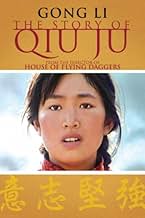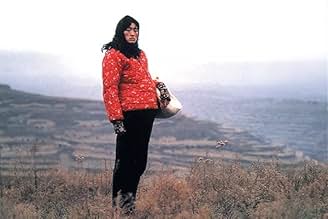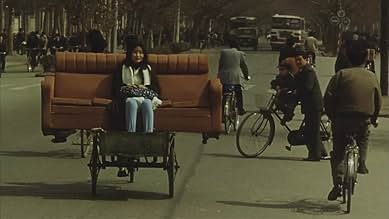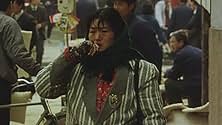IMDb रेटिंग
7.5/10
7 हज़ार
आपकी रेटिंग
अपनी भाषा में प्लॉट जोड़ेंA peasant woman seeks justice after the headman of her village has kicked her husband in the groin.A peasant woman seeks justice after the headman of her village has kicked her husband in the groin.A peasant woman seeks justice after the headman of her village has kicked her husband in the groin.
- पुरस्कार
- 19 जीत और कुल 9 नामांकन
फ़ीचर्ड समीक्षाएं
Most Chinese movies are about victims of the culture or political system or how beautiful you men and women are kept apart or forced together by forces outside their control. This movie is completely different. It is a simple story about the ordinary Chinese people you can meet on the street and in their homes today and their ordinary lives. It is an amazingly accurate portrayal, unlike anything I have seen before. I only spent 3 weeks in China, but this movie brought back the feel of China, its people, and organizations.
Qxi Ju wants an apology from the Chief of the commune for kicking her husband in the groin. This is a story about her travels from the commune to the big city to try to get action from various bureaucracies. Although she is treated kindly and with much respect by the bureaucrats, she never gets exactly what she wants. It is fun to watch naive country girl Qxi Ju quickly learn about master doing things in the big city.
For me, the plot in this movie is secondary. It is each of the simple scenes that make this movie wonderful: The doctor's office is heated by a wood stove and the doctor chops the wood and feeds the fire. Qxi Ju's sister gives here a ride to town on the back of her bicycle on a snow covered unpaved road. They use dried chili peppers to trade for money to get a ride to the next town. Qxi Ju negotiates for the price of each thing she buys. The scenes all seem so realistic and beautifully photographed.
Yimou Zhang also made "Raise the Red Lantern" which gets higher praise, but that movie is about a world that is harder for me to relate to. This movie is like real life and real people and China today.
Qxi Ju wants an apology from the Chief of the commune for kicking her husband in the groin. This is a story about her travels from the commune to the big city to try to get action from various bureaucracies. Although she is treated kindly and with much respect by the bureaucrats, she never gets exactly what she wants. It is fun to watch naive country girl Qxi Ju quickly learn about master doing things in the big city.
For me, the plot in this movie is secondary. It is each of the simple scenes that make this movie wonderful: The doctor's office is heated by a wood stove and the doctor chops the wood and feeds the fire. Qxi Ju's sister gives here a ride to town on the back of her bicycle on a snow covered unpaved road. They use dried chili peppers to trade for money to get a ride to the next town. Qxi Ju negotiates for the price of each thing she buys. The scenes all seem so realistic and beautifully photographed.
Yimou Zhang also made "Raise the Red Lantern" which gets higher praise, but that movie is about a world that is harder for me to relate to. This movie is like real life and real people and China today.
Zhang Yimou's "The Story of Qiu Ju" is not a masterpiece as is his film "Raise the Red Lantern." It doesn't have the epic qualities of "To Live" nor is it as visually stunning as "The Road Home." But "Qiu Ju" may well be Yimou's most thought provoking film, leaving you pondering the messages a long time after the film has ended.
Qiu Ju's husband has been kicked ("where it counts") by the village chief. The only bit of justice Qiu Ju wants is an apology. It seems to be a simple enough request, but her search for the apology proves to be elusive as she encounters a legal system more interested in its own red tape than in the needs of ordinary people.
But this is not "Erin Brockovich" where the sides of "good" and "bad" are easily defined. The people in the legal system Qiu Ju encounters are genuinely decent folks. They are also, unfortunately, a bit clueless. And Qiu Ju is not beyond reproach herself. At the conclusion of the film even she is realizing that she has pushed the matter too far.
Just how far should one go to seek justice in this world? Even if you are totally in the right, does there come a time when you must let the matter rest for your own sake as well as everybody else's? There are no easy answers.
This is another great performance by Gong Li in the title role. She may be one of the most beautiful women in the world, but here she is not above playing "dowdy." And as usual, Zhang Yimou is nearly flawless in his direction. He gives a wonderful tip of the hat to the late French director Francois Truffaut in the end, echoing that famous final shot of Truffaut's "The 400 Blows."
But this is a film that will stick with you well past that last shot.
Qiu Ju's husband has been kicked ("where it counts") by the village chief. The only bit of justice Qiu Ju wants is an apology. It seems to be a simple enough request, but her search for the apology proves to be elusive as she encounters a legal system more interested in its own red tape than in the needs of ordinary people.
But this is not "Erin Brockovich" where the sides of "good" and "bad" are easily defined. The people in the legal system Qiu Ju encounters are genuinely decent folks. They are also, unfortunately, a bit clueless. And Qiu Ju is not beyond reproach herself. At the conclusion of the film even she is realizing that she has pushed the matter too far.
Just how far should one go to seek justice in this world? Even if you are totally in the right, does there come a time when you must let the matter rest for your own sake as well as everybody else's? There are no easy answers.
This is another great performance by Gong Li in the title role. She may be one of the most beautiful women in the world, but here she is not above playing "dowdy." And as usual, Zhang Yimou is nearly flawless in his direction. He gives a wonderful tip of the hat to the late French director Francois Truffaut in the end, echoing that famous final shot of Truffaut's "The 400 Blows."
But this is a film that will stick with you well past that last shot.
10jtur88
I've visited rural China, and this is the most realistic film I have ever seen. I was awestruck at how well this film captures exactly the China that a modern visitor to the country would see. Not just the landscapes---the people are portrayed just as they are. I carry a copy of this film with me to show my friends and family--I know of no better way to illustrate the China that I actually saw. In addition, as a film-goer, I loved this film for its austere simplicity of production. I found myself wondering how many of the people who appeared on the screen were actually actors---as opposed to just having a candid camera imposing itself into their daily lives. I loved the scene in the office where an official was issuing a marriage license to a young couple---this was a spine-tinglingly poignant scene that, to me, underscored the genuine humanity that would seem so impossible in such a country---a humanity that is real. The Chinese are lovely, gentle people, and it was a delight to see a film that accurately reflects this character.
When her husband insults a neighbor and is nearly 'emasculated', a peasant woman goes to great lengths to secure justice. Many people in the West may not understand why this woman is so determined to right such a 'minor' wrong. In Chinese culture, an assault on another man's "honor" is not viewed as a 'minor' thing; having children is very important and carries a greater social significance than it does in the West. It is expected of every man, and having a son, especially, to work in the fields for the good of the family and carry on the family name, has been worshipped as a Confucian ethic for centuries. China is still very much a paternalistic society (despite Communist reform),and the 'one child' policy has only reinforced the old Chinese adage that "if you bear a girl,bear a beautiful one, if you bear a son, bear an intelligent one." So understandably,from the viewpoint of Qiu Ju,not only does her husband suffer but her entire family name and honor suffers too, when the man is attacked in a 'sacred place', his gonads. The village chief, the fellow who delivered the disabling kick,has also been dishonored by the husband's insult about "having hens" and not boys. By kicking the offending man in the balls, the village chief wanted to save his face, hence the stalemate. But for Qiu Ju, and certainly in Chinese eyes, the greater wrong is the assault on her husband's reproductive organs. A delightful movie, so well acted with quite a few funny moments surrounding a serious issue. Zhang Yimou is one fine director.
This is a small thing, but ripe, all about learning to naturally go out among life.
This is is first in the story. A wife demands to know why her husband was kicked "where it hurts" by a local official. Why did he do it? She ventures out in the village, then down in the city in search of answers. The tip of the thread that humorously guides us through different faces so that altogether we get a snapshot of Chinese life.
A constable arbites and gives his verdict, which seems perfectly reasonable, the accused will cover medical expenses and both parties are made aware that they were both wrong. But the wife is not pleased, she wants a more significant justice, and will go through the state apparatus looking for it.
This has led some viewers to think that we're meant to be seeing an individual being caught in the gears of an absurd and uncaring bureaucracy; that seems to be a handy interpretation we have in the West ever since Kafka. But that's not the point being made here.
Party officials, whenever encountered, are always benevolent and trying to be fair, quietly exasperated by the antics of the people in their charge. A higherup is kind enough to drive her back to the hotel on his car, another one stoically returns someone's stray animal. You can see why this among Zhang's early work was not banned over there.
But every new verdict from higher offices remains the same however, which is to say, the world is just so, maybe not ideal. Why make a fuss about why we do things, why stand so rigidly? There's no deeper reason sometimes and we're better off mending ourselves by moving forward, going along unconstrained by "right" and "wrong". This is often hard to translate to someone in the West because we have made ourselves stupid by arguing from principle instead of seeing what the specific thing in front of us calls for now.
And the notion of contrived uncontrivance extends in everything else. Zhang is aiming for a snapshot of life whereby we just mingle with things, what they used to call "neorealism" back in the day. The view it ventures to offer will be precious, a heartland generally closed to us.
More pertinently for me, it evokes a view of life, a warmth and sense of community I like. Lovingly obstinate in trying to fathom its tempests, pettiness without malice, quiet perseverance in simple things. Zhang lets all of this envelop in a natural way, as impulse that climbs up through the soles of the feet.
Gong Li is perfectly in tune with this, sublime in erasing any trace of an actor's face behind the shawl, making herself like a stump of uncontrived urges. We're meant to see that though a kind person, she's also a little dull in her fixation to an apology. And look how naturally she comes forth from her body, then watch her as the nervous empress in Golden Flower. What a range in which she moves freely.
This is is first in the story. A wife demands to know why her husband was kicked "where it hurts" by a local official. Why did he do it? She ventures out in the village, then down in the city in search of answers. The tip of the thread that humorously guides us through different faces so that altogether we get a snapshot of Chinese life.
A constable arbites and gives his verdict, which seems perfectly reasonable, the accused will cover medical expenses and both parties are made aware that they were both wrong. But the wife is not pleased, she wants a more significant justice, and will go through the state apparatus looking for it.
This has led some viewers to think that we're meant to be seeing an individual being caught in the gears of an absurd and uncaring bureaucracy; that seems to be a handy interpretation we have in the West ever since Kafka. But that's not the point being made here.
Party officials, whenever encountered, are always benevolent and trying to be fair, quietly exasperated by the antics of the people in their charge. A higherup is kind enough to drive her back to the hotel on his car, another one stoically returns someone's stray animal. You can see why this among Zhang's early work was not banned over there.
But every new verdict from higher offices remains the same however, which is to say, the world is just so, maybe not ideal. Why make a fuss about why we do things, why stand so rigidly? There's no deeper reason sometimes and we're better off mending ourselves by moving forward, going along unconstrained by "right" and "wrong". This is often hard to translate to someone in the West because we have made ourselves stupid by arguing from principle instead of seeing what the specific thing in front of us calls for now.
And the notion of contrived uncontrivance extends in everything else. Zhang is aiming for a snapshot of life whereby we just mingle with things, what they used to call "neorealism" back in the day. The view it ventures to offer will be precious, a heartland generally closed to us.
More pertinently for me, it evokes a view of life, a warmth and sense of community I like. Lovingly obstinate in trying to fathom its tempests, pettiness without malice, quiet perseverance in simple things. Zhang lets all of this envelop in a natural way, as impulse that climbs up through the soles of the feet.
Gong Li is perfectly in tune with this, sublime in erasing any trace of an actor's face behind the shawl, making herself like a stump of uncontrived urges. We're meant to see that though a kind person, she's also a little dull in her fixation to an apology. And look how naturally she comes forth from her body, then watch her as the nervous empress in Golden Flower. What a range in which she moves freely.
क्या आपको पता है
- ट्रिवियाThe Chinese title is "Qiu Ju Files a Lawsuit"
टॉप पसंद
रेटिंग देने के लिए साइन-इन करें और वैयक्तिकृत सुझावों के लिए वॉचलिस्ट करें
- How long is The Story of Qiu Ju?Alexa द्वारा संचालित
विवरण
बॉक्स ऑफ़िस
- US और कनाडा में सकल
- $18,90,247
- US और कनाडा में पहले सप्ताह में कुल कमाई
- $25,785
- 18 अप्रैल 1993
- दुनिया भर में सकल
- $18,90,247
- चलने की अवधि1 घंटा 40 मिनट
- रंग
- पक्ष अनुपात
- 1.85 : 1
इस पेज में योगदान दें
किसी बदलाव का सुझाव दें या अनुपलब्ध कॉन्टेंट जोड़ें
























